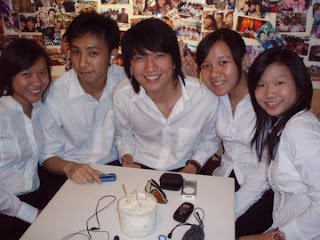Here are some pictures to 'jumpstart' this entry on group communication. What better way to show than photos with my friends:)
 My closest bunch in Ngee Ann poly. We were at Island Creamery after the Graduation Photo Shoot. Enjoying our get-together after-school sessions...like we always do.
My closest bunch in Ngee Ann poly. We were at Island Creamery after the Graduation Photo Shoot. Enjoying our get-together after-school sessions...like we always do. With my teammates from NZ, Aust, South Africa on the 1 month Taiwan trip in Dec 2008
With my teammates from NZ, Aust, South Africa on the 1 month Taiwan trip in Dec 2008
The Mauritian darlings, whom I built good friendships with in Taiwan.
Ok, now for the serious stuff.
Here is a brief overview: Our tendency to form groups is a pervasive aspect of organisational life. As well as formal groups, committees and teams, there are informal groups, cliques and cabals. So now, I'll touch on group communication in a clique(something more personal for us to relate la).
It's innate in us to identify ourselves with a particular group-think mod, edgy, the hippies, the athletics and the geek chics. Even from kindergarten, we see young children being in different cliques. And of course, communicating in their own little 'lingo' that no one else understand but themselves. Being in a group provides that sense of belonging, identity, a haven for one to seek advice, divulge secrets, plan work together. There's so many possibilities and benefits of being in a group(or in the case of the extreme, not too beneficial). Overall, group communication is essential in life-to get work done, to make friends, for socialisation.
Let me share a personal example of group communication that has lost its 'vitality'.
That is, 'phasing out with my secondary school clique'. In case you're thinking we do not hang out anymore, we actually still meet up on birthdays and special occasions like christmas(they celebrated my birthday last year and gave a surprise treat). As taught in class, I consider myself a marginal member. Not that we don't find enjoyment in each other's company, it's just that along the way after secondary school life, we made new cliques and the attachment we had back then became less significant. A weak attachment, bluntly speaking. It's hi, bye after each meeting and we go back to our own poly and jc cliques.
Then, let's sidetrack back to our hang-out cliques. It all starts with getting to know each other, then self-disclosure(recap of interpersonal communication). For me, the friends I hang out with are my pillars of strength, influence, comfort and happiness. We do think alike and analyse towards the same perspective(you could say we have the same behavioural standards after a long time together).Even our criticisms and style of doing things are almost the same. Interesting, but scary though! Hurhur.
Though group communication may seem hard to achieve(hey group communication is the root of miscommunication amplified as compared to interpersonal ones), it actually shows how well we interact with the different parties and understand them. Basically, it shows the closeness of the group. Once group communication shows signs of flaws, then you'll know it's unsuccessful.
As what Franklin Roosevelt said, " Be sincere, be brief, be seated." Now, that's what I call good group communication. How about you?

